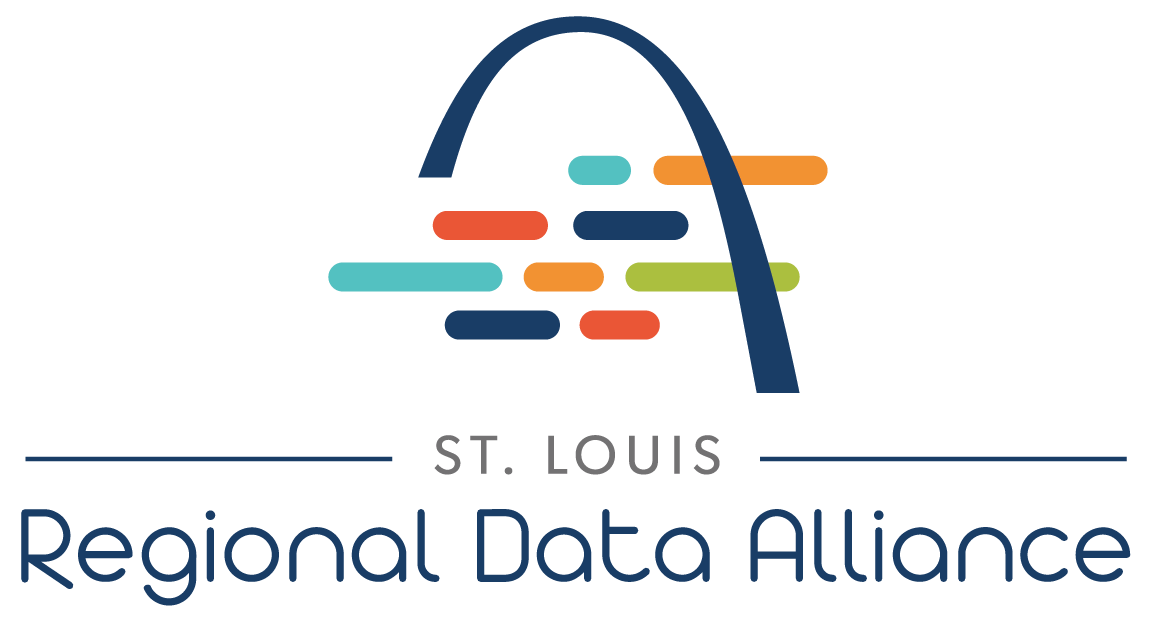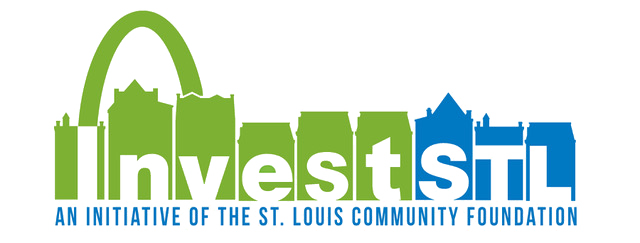St. Louis Regional Data Alliance
St. Louis needs good data to improve the lives of people in our region. We must understand the depth of our community’s needs, the quantity and quality of public and nonprofit resources, and the effectiveness of our investments. No one institution or effort can do this alone — and the impact of connecting information from our region’s many data stakeholders will be far more than the sum of its parts. This recognition drives the creation of the St. Louis Regional Data Alliance (RDA), a collaborative governing body that is establishing a powerful agenda for how our region can better use data for community change.

The RDA's mission is to build shared data infrastructure and support strong data actors that use quality data to improve people's lives. Its diverse Steering Committee guides the implementation of an 18-month startup strategy and includes representatives from the following community institutions:
The RDA's work is led by a dynamic team of data nerds, entrepreneurs, and community organizers. They include:
Ben Cooper, Health and Community Data Scientist: Ben works to develop and build regional data capacity, with a particular focus on health and social services data. He has spent his entire career working with healthcare data in multiple capacities across a variety of settings, from academia to nonprofit to corporate managed care. He spent 8 years as Director of Research & Technology at Nurses for Newborns Foundation and over 8 years at Washington University in St. Louis in various roles ranging from statistical analyst, IRB member and Center Manager of the Public Health Data & Training Center within the Institute for Public Health. Ben has extensive experience with program and outcomes evaluation, biostatistics, data visualization, data training and education. He holds a master’s degree in public health from Saint Louis University, with a joint concentration in biostatistics and epidemiology.
Jonathan Leek, Regional Data Architect: Jonathan is a data architect and cloud specialist with a history of entrepreneurship and civic involvement. Jonathan previously served as a Data and Analytics consultant for Daugherty Business Solutions and cofounder of OpenSTL, Saint Louis' Code for America Brigade. He has also served on the board of the Saint Louis Game Developers Co-op, and as the Director of Special Projects for Lumate, an Arch Grant winning mobile ad arbitrage company. Some of Jonathan's projects include the Saint Louis Vacancy Portal, which he presented at StrangeLoop in 2018. He has contributed to numerous published mobile games, and organized 20+ hackathons in the Saint Louis area. Jonathan graduated from Missouri University of Science and Technology in 2009.
Paul Sorenson, Director of the Regional Data Alliance: Paul is a community builder and social entrepreneur who leads the RDA as an Associate Director of UMSL's Community Innovation and Action Center. Paul previously founded and ran GoodMap, an online tool for nonprofits to organize information about the services they provided to their communities. He also served as the Director of Strategic Planning at Grace Hill Settlement House from 2012 to 2017. Paul graduated from the Brown School of Social Work at Washington University in St. Louis in 2012 and is slowly pursuing a Ph.D. in Political Science from the University of Missouri-St. Louis. He was named one of the St. Louis Business Journal’s 30 Under 30 in 2014 and was a FOCUS St. Louis Impact Fellow as part of its 2016 inaugural cohort centered on racial equity.
The RDA's broader membership of over 130 community leaders is growing — we welcome you to sign up here to stay in the loop about our exciting next steps!
Over the coming months, the RDA will release a number of tools and pilot projects that build regional data capacity and underscore our collaborative approach, including:
- A regional open data repository, the St. Louis Regional Data Exchange, that leverages open source technology ( CKAN) used by cities like Pittsburgh and national resources like data.gov to provide a simple, open, and powerful repository for public data sets.
- A technology plan for the St. Louis Community Information Exchange, a network of health and social service partners that use a shared technology platform to connect people to best-fit resources and improve long-term service outcomes. This work is being led by United Way 211, with the RDA joining BJC Healthcare, the Race and Opportunity Lab at Washington University, and many others to guide its development. Associated RDA projects leveraging shared technology to connect people to resources across a network of partner organizations are also underway in criminal justice, homeless services, and infant mortality.
- An expansion of All Things St. Louis , a data visualization platform that organizes important national health and community indicators that can be used locally to inform regional problem solving. This platform is being developed in collaboration with the Center for Applied Research and Engagement Systems at the University of Missouri — and will be used to house the upcoming United Way Needs Assessment and a Statewide Early Childhood Needs Assessment, making associated data easy to access by a variety of audiences.
- The evolution of the St. Louis Vacancy Portal , which integrates 12 City of St. Louis datasets across 4 departments to create the first comprehensive understanding of vacant land in St. Louis. The RDA's Data Architect is currently working to automate the ingestion and transformation of these data for long-term sustainability — as well as expand these techniques to additional City datasets to create a unified understanding of City parcel data alongside other important health and economic development data.
- The launch of the RDA's very own website, which will dive into our approach and these projects in glorious detail. Stay tuned!
Questions or comments can be directed to Paul Sorenson, Director of the RDA, at sorensonp@umsl.edu.
Invest STL
 Sponsored by the St. Louis Community Foundation, Invest STL is a regional initiative that aligns investment, technical assistance, and community organizations and the residents they serve to build healthy neighborhoods that are thriving, resilient, and livable for everyone. Invest STL supports capacity building with community organizations, community engaged neighborhood planning, and implementation of neighborhood revitalization strategies.
Sponsored by the St. Louis Community Foundation, Invest STL is a regional initiative that aligns investment, technical assistance, and community organizations and the residents they serve to build healthy neighborhoods that are thriving, resilient, and livable for everyone. Invest STL supports capacity building with community organizations, community engaged neighborhood planning, and implementation of neighborhood revitalization strategies.
UMSL Anchor Institution Initiative
 UMSL participates in the national Higher Education Anchor Mission Initiative comprised of over 30 higher education institutions as a joint project of the Coalition of Urban and Metropolitan Universities and The Democracy Collaborative. Anchor institutions are place-based entities rooted in their local communities by mission, invested capital, or relationships to customers, employees, and vendors. Anchor institutions apply their long-term, place-based economic power, in combination with their human and intellectual resources, to better the long-term welfare of the communities in which they reside.
UMSL participates in the national Higher Education Anchor Mission Initiative comprised of over 30 higher education institutions as a joint project of the Coalition of Urban and Metropolitan Universities and The Democracy Collaborative. Anchor institutions are place-based entities rooted in their local communities by mission, invested capital, or relationships to customers, employees, and vendors. Anchor institutions apply their long-term, place-based economic power, in combination with their human and intellectual resources, to better the long-term welfare of the communities in which they reside.
As a public land-grant university and one of the largest employers in North County, UMSL serves as a core anchor institution in North St. Louis County. UMSL’s Anchor Institution Committee, comprised of leadership across the university, sets strategy and coordinates UMSL’s anchor institution work. The university’s anchor institution activities are focused in four areas: economic development, education, health and social services, and housing and community development.



